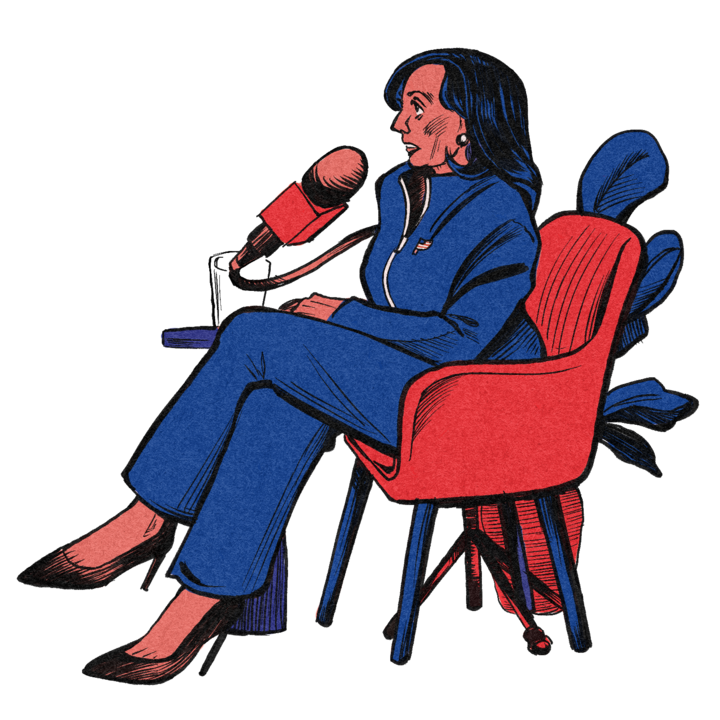Election Issue 2024 | Forum
Harris took advantage of Call Her Daddy’s feigned neutrality. Why wouldn’t she?

AnaElda Ramos | Illustration Editor
Vice President Kamala Harris addressing the “Daddy Gang” was not on my 2024 Bingo card. But Donald Trump surviving two shots to the head wasn’t either, so maybe nothing is off the table this election cycle.
Harris’s appearance on Call Her Daddy earlier this month garnered a flurry of media attention — some hailing the appearance as a “smart” move, and others claiming it may have backfired. Harris’ stop on the sex and relationship podcast, hosted by Alex Cooper, was one of many media appearances the presidential candidate made recently, including 60 Minutes and The View.
Perhaps most striking was Cooper’s introduction to the podcast with an apology. She begins by explaining that she does not usually discuss politics because she wants the show to be “comfortable” for all listeners. She said that regardless of the topic — be it mental health, relationships, or sex — her focus is always on women.
“At the end of the day, I couldn’t see a world in which one of the main conversations of this election is women, and I’m not a part of it,” Cooper said.
The differentiation of personal issues from the political, as reflected by Cooper’s podcast, allows for social and political injustices to permeate private lives without notice. It is difficult for me to imagine a world where conversations about sex and mental health, especially in their relation to gender, could be anything but political.
Every election, whether explicit or not, is about women. This portrayal of neutrality, however, is what keeps Cooper’s politically diverse audience engaged — the same audience that Harris hopes to capture, and the same audience that would further her chances in a race to the presidency.
So if Cooper wants to maintain the illusion that her platform is apolitical, that is in her right — it benefits Harris all the better.
If anything, the Vice President’s appearance on the show reflects a broader public shift from traditional news outlets to narrowcast media. Harris’ Call Her Daddy debut is an attempt to reach otherwise politically disengaged voters or those leaning to the other side of the spectrum — a campaign decision that Trump made months ago. In what has been dubbed as an attempt to win the “bro vote,” the former President participated in interviews with YouTubers and podcasters including Logan Paul, Theo Von, and the Nelk Boys, all of which appeal to male-centric audiences.
Public trust in American media remains low, especially among Republican voters. Journalists have long struggled to engage viewers on the right, and figures like Matt Walsh and Tucker Carlson have risen to fill that gap.
As an aspiring journalist, it is saddening — yet unsurprising — that politicians value time with influencers more than time with journalists. It is unlikely that influencers would press a candidate with hard-hitting questions the way a journalist would.
Today, though, alternative media is where the younger audiences exist, and no amount of journalistic prowess changes the fact that Cooper’s podcast has been the second-most-listened to podcast on Spotify since 2021.
Aside from her large audience, Cooper’s interview with Harris also offered an angle of the Vice President that viewers would be unlikely to access elsewhere. Call Her Daddy gave Harris an opportunity to talk more about her personal life, such as her own experiences with misogyny and being raised by a single mother. She interwove those personal experiences with the political — how regulation of women’s bodies led to Amber Thurman’s death, and how Harris is the first Vice President to visit a healthcare clinic. As a whole, the podcast humanized Harris in a way that many news outlets fail to.
Cooper views her podcast as outside the realm of politics — even while a presidential candidate sits in the seat across from her. Even as the two women bond over misogynistic comments they’ve received, or the fact that many men are clueless to what tampons are, let alone how pregnancy works.
While Cooper can present her podcast with a facade of neutrality, Harris’ appearance reinforces the inevitable fact that a show focused on women’s issues is inherently political. At a time when the gender gap continues to widen, Harris used Call Her Daddy as an opportunity to help expose just how deeply our personal lives are entrenched in the political.
